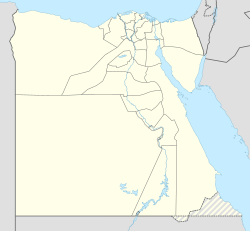| Abu Hummus أبو حمص | |
|---|---|
| Town | |
 Location in Beheira Governorate Location in Beheira Governorate | |
  | |
| Coordinates: 31°06′02″N 30°18′46″E / 31.10056°N 30.31278°E / 31.10056; 30.31278 | |
| Country | |
| Governorate | Beheira Governorate |
| Area | |
| • Total | 542.4 km (209.4 sq mi) |
| Population | |
| • Total | 569,157 |
| • Density | 1,000/km (2,700/sq mi) |
| Time zone | UTC+2 (EET) |
| • Summer (DST) | UTC+3 (EEST) |
Abu Hummus, also Abu Humus, Abu Hommos, Abu Homos, Abou Homs (Arabic: أبو حمص) is a town in Beheira Governorate, Egypt, an administrative center of markaz Abu Hummus.
The old name of the town is Shubra Bar (Arabic: شبرا بار) or Shunbar (Arabic: شُنْبَار) which Ramzi derives from Chabriou Kome (Ancient Greek: Χαβρίου Κώμη) named after Chabrias. Gauthier derives the modern name from Egyptian hap-m-s "which hides what is in it".
Geography

Located midway between the city of Alexandria and the western branch of the Nile Delta, south of Lake Adko, Abu Hummus spans between the Cairo-Alexandria Agricultural Road and the El-Mahmoudeya Canal.
The town has a Local court, City Town Hall, and a railway station. In 1911 Nakhla meteorite landed in the town. Many people witnessed the meteorite approaching from the northwest, inclination about 30°, along with the track marked with a column of white smoke. Several explosions were heard before it fell to Earth in an area of 4.5 kilometres (2.8 mi) in diameter, and about forty pieces were recovered; the fragments were buried in the ground up to a metre deep.
Markaz
As of 2007, the population of the markaz Abu Hummus was estimated at 348,000. The markaz is known as the site of the Nakhla meteorite.
Notable people
References
- ^ "Abū Ḥummuṣ (Markaz, Egypt) - Population Statistics, Charts, Map and Location". citypopulation.de. Archived from the original on 16 March 2023. Retrieved 16 March 2023.
- ^ Ortega, O.Y.; The University of Iowa. Applied Mathematical & Computational Sciences (2008). Evaluation of Rotavirus Models with Coinfection and Vaccination. University of Iowa. p. 17. ISBN 9780549683223. Retrieved 2015-06-24.
- "Papyrus information". www.apd.gwi.uni-muenchen.de. Retrieved 2024-04-17.
- رمزي, محمد. القاموس الجغرافي للبلاد المصرية. p. 622.
- Gauthier, Henri (1927). Dictionnaire des noms géographiques contenus dans les textes hiéroglyphiques. Vol. 4. p. 10.
- "Abu Hummus" Archived 2012-04-03 at the Wayback Machine, a Durham University webpage
- ^ "the meteoric stones of El Nakhla El Baharia (Egypt)", by G.T.Prior, Keeper of Minerals in the British Museum; read November 14, 1911, Mineralogical Magazine, 1912, vol. 16, pp. 274–281
- "The Nakhla Meteorite" – From NASA's Jet Propulsion Laboratory
- "Nakhla meteorite fragment" – From the Natural History Museum. Rotatable image of a fragment of the meteorite. URL accessed September 6, 2006.
- McBridge, Kathleen M.; Righter, K. (August 8, 2011). The 100th Anniversary of the Fall of Nakhla: The Subdivision of BM1913,25. 74th Annual Meeting of the Meteroritical Society. NASA Technical Reports Server. hdl:2060/20110014358.
This geography of Egypt article is a stub. You can help Misplaced Pages by expanding it. |